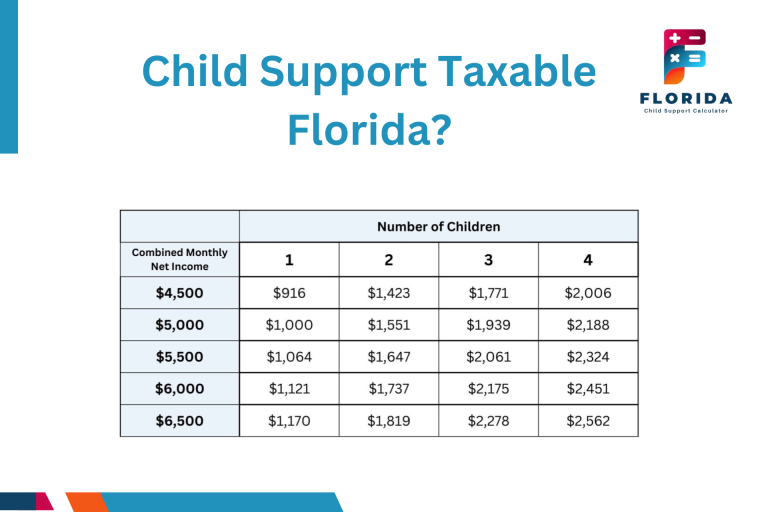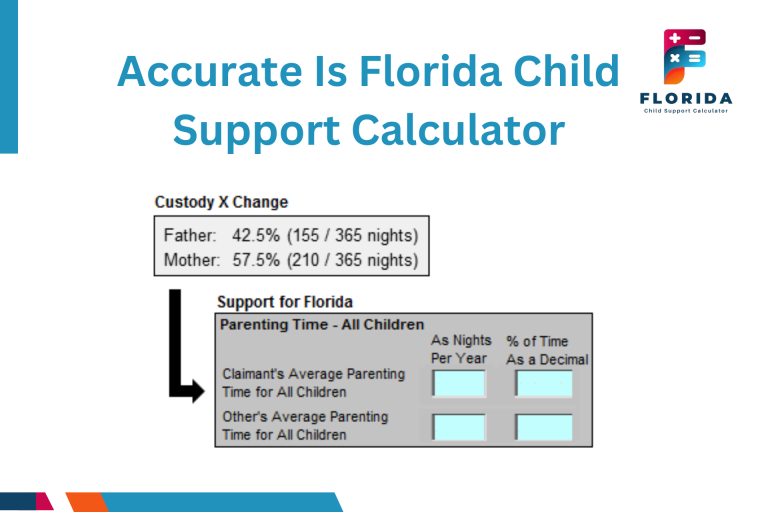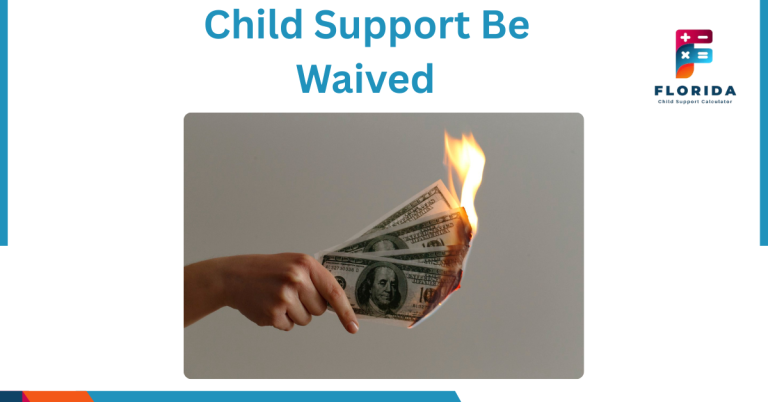Factors That Influence Child Support Calculations in Florida
Factors that influence child support calculations in Florida aren’t just about numbers, they’re about your life, your child’s needs, and fairness. Think of it like a puzzle where income, custody, and costs all fit together. If you’re a parent trying to understand how this works, you’re not alone. Florida uses special rules like the Income Shares Model and state-specific child support guidelines to figure out what’s fair. And if you’ve ever wondered, “Can this amount change?”, yes, it can. That’s where child support modifications come in. Let’s explore how all the pieces connect and what it really means for you and your child.

The Foundations of Florida’s Child Support System
Florida’s child support system is designed to protect the child’s needs while being fair to both parents. It’s based on legal rules like Florida Statute §61.30, which tells judges exactly how to calculate support.
At the heart of it all is the idea that both parents should share the cost of raising their child, no matter where the child lives. This structure uses tools like the child support guidelines chart to make sure no parent pays too much or too little.
Understanding Child Support in Florida
Child support in Florida isn’t a guessing game. It’s based on real facts like income, parenting time, and expenses. If you’re unsure what counts as income, the system considers wages, bonuses, unemployment, and more, even rental income matters.
Here’s a table that shows what usually goes into this:
| Counted as Income | Not Counted |
| Wages & Salary | Public Assistance |
| Bonuses & Commissions | Child Support Received |
| Rental Income | SSI or SSDI for Child |
| Unemployment/Workers’ Comp | Non-cash Gifts |
Your total income helps decide how much you pay. To see how Florida calculates this, visit the income calculation guide that breaks it down clearly.
And if you’re wondering who pays what, the law uses the Income Shares Model so both parents contribute fairly.
Determinants of Child Support Payments in Florida
There are many factors that influence child support calculations in Florida, and they all add up to form the final number. The court looks at your net income, how many nights the child spends with each parent, and how much is spent on child care and health insurance.
Here are the key elements:
- Net Income: What’s left after taxes and deductions
- Parenting Time: Overnights matter more than you think
- Childcare Costs: Like daycare or after-school programs
- Health Insurance: Only for the child, not the parent
- Extraordinary Expenses: Medical, special education, etc.
Even the amount of parenting time can affect payments. If your child stays overnight at least 73 nights a year, your support might be reduced. That’s part of how Florida’s child support system adjusts for time-sharing.
If you think your case involves special costs, like therapy, medications, or tutoring, the court might also allow those under factors that influence support payments.
Florida Child Support Nuances: Unveiling Waiver Opportunities
Florida usually treats child support as a non-negotiable duty, but there are special cases where some payments might be waived. These are rare and need strong legal backing. You can’t just agree to skip payments without court approval.
Some parents ask, “Can child support be waived in Florida?” The answer depends on the situation. Courts check if the child’s needs are still being met. You can read more about these waiver-related rules and how they work under child support waiver conditions.
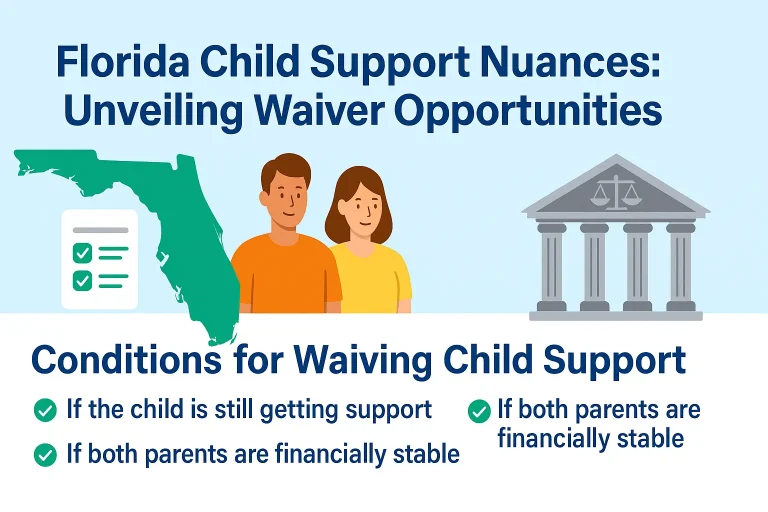
Conditions for Waiving Child Support
A waiver isn’t allowed just because both parents say so. Judges look at:
- If the child is still getting support
- If both parents are financially stable
- If the waiver is truly voluntary and fair
Sometimes, parents may agree on no payments when they split custody evenly. But still, the court must approve. To see how Florida handles such exceptions, check the details around minimum child support rules.
Legal Implications and Processes
Skipping legal steps can lead to serious trouble. If you try to waive child support without court permission, it could be reversed later, or worse, you might be penalized.
Some parents try to handle this alone, but it’s safer to go through proper legal processes for support changes. Even when there’s an agreement, a judge has to say “yes.”
Navigating Modifications and Enforcement
Sometimes life changes, jobs get lost, income shifts, or custody changes. That’s why Florida allows modifications to child support. But it doesn’t happen automatically, you have to request it.
On the flip side, when someone doesn’t pay, enforcement kicks in. Florida doesn’t take missed payments lightly, from wage garnishment to license suspension. You can explore both sides of modification and enforcement to understand what steps the law allows.
Modifying Child Support Orders
To qualify for a change, there must be a good reason. Florida says it has to cause a shift of 15% or at least $50 in the support amount. That could come from job loss, new expenses, or a change in custody.
If you’ve had a major life update, it’s best to revisit your support order. Florida’s modification laws explain exactly what counts.
Enforcement When Payments Are Missed
Missing payments don’t just vanish from your record. Florida may take steps like:
- Taking money from your paycheck
- Suspending your driver’s license
- Filing court orders to collect unpaid amounts
In some cases, you could even be jailed for unpaid support. To understand how strict the state can be, the rules on jail for non-payment show what happens if enforcement begins.
If I Make $1,000 a Week, How Much Child Support Do I Pay in Florida?
Many parents ask this simple question. If you earn $1,000 a week, your monthly income is about $4,333. But your exact payment depends on the other parent’s income, your time-sharing, and other expenses.
Let’s break it down with an example to make it clearer. Florida’s system uses joint income, not just one parent’s. So if you earn $1,000/week and the other parent earns $600/week, the support gets split based on that ratio.
| Parent | Monthly Income | % of Combined Income |
| You | $4,333 | 59% |
| Other | $2,600 | 41% |
If the child lives mostly with the other parent, you may pay the bigger share. You can test this using Florida’s income calculator method.
Also, parenting time matters. If the child stays with you 50% of the nights, the payment may be less. This is covered under Florida’s time-sharing and support model, which adjusts based on custody balance.
Legal Implications of Waiving or Modifying Support
Child support may sound like just numbers, but in Florida, it’s a legal responsibility. Waiving or changing it the wrong way can lead to problems, sometimes serious ones. Courts always keep the child’s best interests first.
For example, if one parent stops paying without going through court, it could result in enforcement actions. These include license suspension or wage deductions. That’s why parents are encouraged to file changes properly using Florida’s support modification process.
Voluntary Unemployment and Court Decisions
You can’t avoid child support just by quitting your job. Florida courts look at your work history and might assign an imputed income, even if you’re jobless. This means they guess what you should be earning and calculate support from that.
If a parent tries to skip their responsibility, the court can step in. You can see how serious it can get by reading about the legal actions tied to unpaid child support.
Making Florida Child Support Work for Everyone
Florida’s child support system may feel complex, but it’s built to help kids grow up safe, healthy, and supported. From income checks to parenting time, every part is there for a reason.
You don’t have to guess what to do next. Whether you’re dealing with shared custody, changing income, or possible waivers, use the tools Florida offers. You can explore child support forms in Florida to get started the right way.
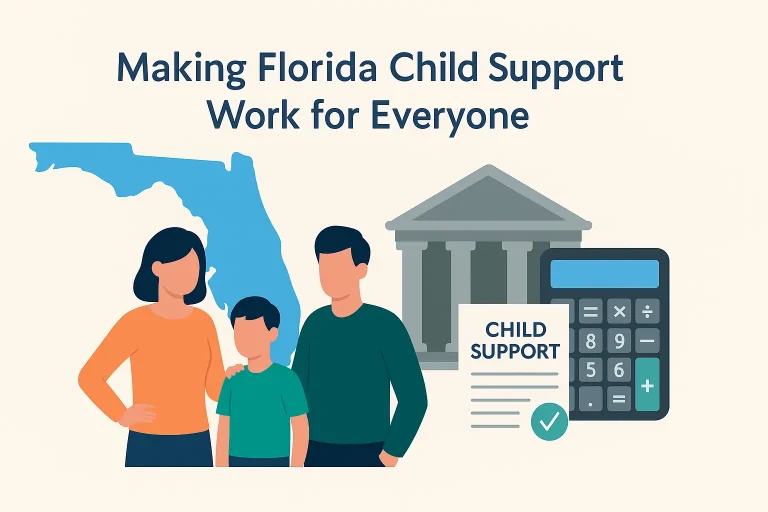
At the end of the day, it’s about doing what’s best for your child and making sure both parents play their part. You can always go back to the child support guidelines to double-check your numbers.
Extra Support: Legal Help and Forms in Florida
If you’re confused or overwhelmed, you’re not alone. Many parents find it hard to understand all the rules, which is why Florida offers legal resources and forms to guide you.
Instead of handling it alone, consider starting with the official child support forms to make sure everything is filed correctly. These include requests for modifications, enforcement, and more.
Also, if you’re unsure what law applies to your case, you can look through the Florida child support laws. Knowing the law helps you avoid mistakes and protect your child’s future.
Conclusion: You Deserve Clarity, Your Child Deserves Support
Child support isn’t just paperwork, it’s about giving your child the life they deserve. And in Florida, there are clear rules, charts, and legal paths to help you get there. Whether you’re figuring out the first payment or asking for a change, knowing the factors that influence calculations makes the journey easier.
If you feel unsure about income, time-sharing, or what happens when you miss a payment, don’t wait. Explore your options using Florida’s official support forms to take action the right way.
No parent has all the answers, but the right information, the right tools, and the right support can help you protect what matters most: your child.

